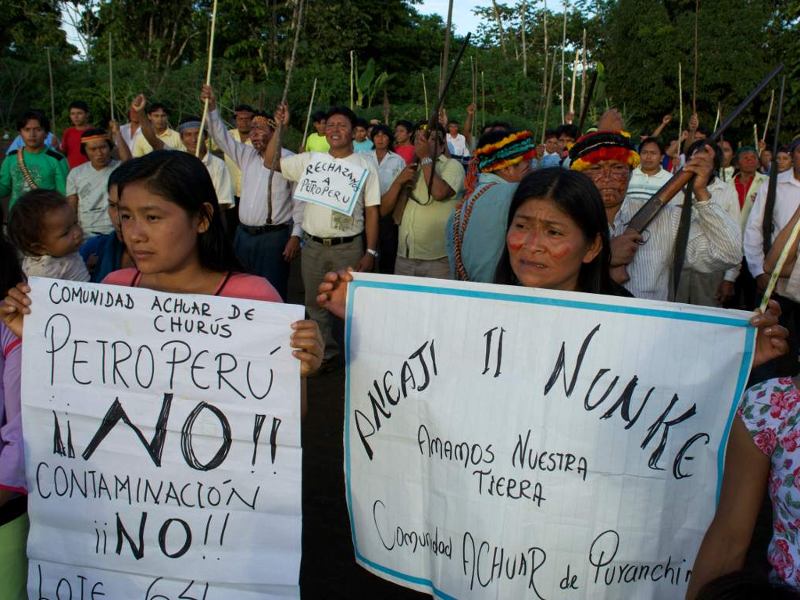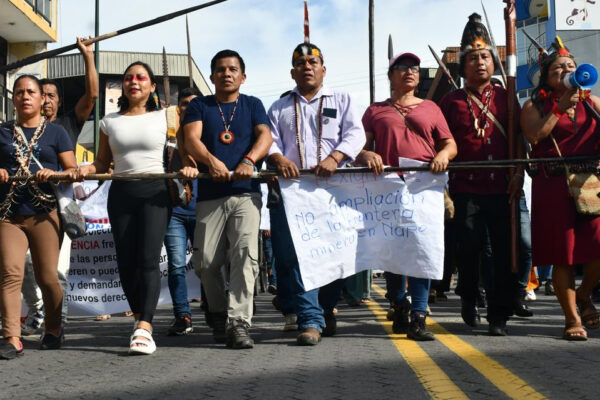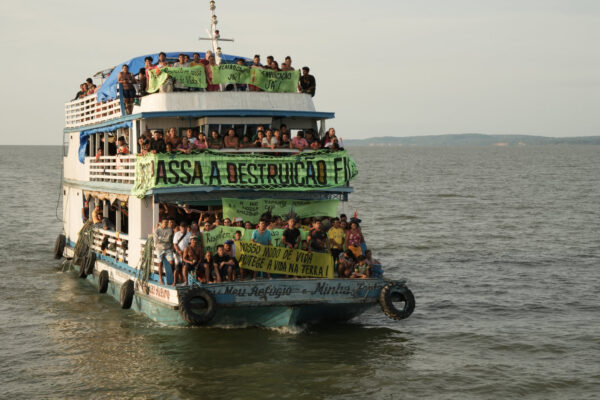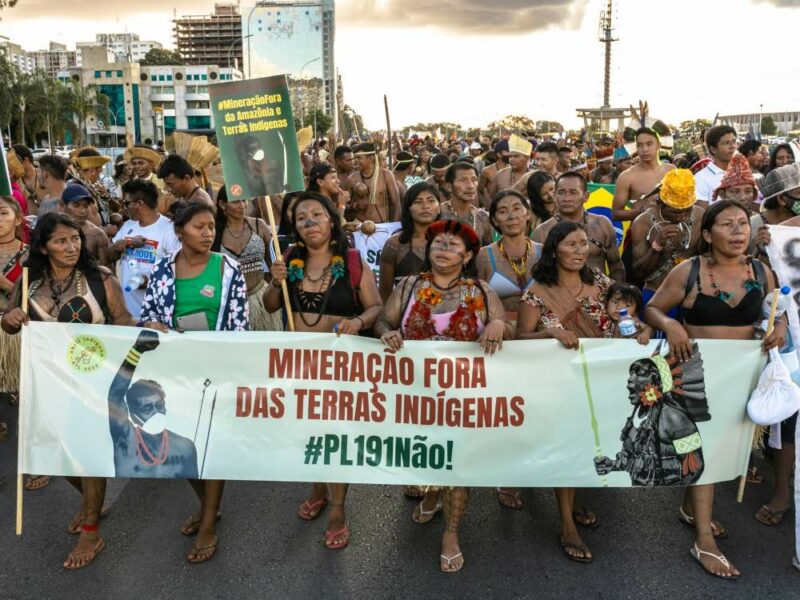
Today, indigenous lands hold much of the world’s remaining natural resources – oil, ore, gas, timber, fresh water – and often the territories through which the transport infrastructure must be constructed to carry those commodities to market. This push further and further into indigenous lands and fragile frontier ecosystems has set the stage for increased conflict between the state, the private sector, and indigenous peoples, pitting indigenous rights against resource rights.
At the root of these conflicts is the failure of companies and governments to have properly sought the consent of the very communities affected by the proposed projects. That failure more and more results in a losing prospect for all three stakeholders involved – the communities, the companies, and the governments.
But from the snow-covered plains of the Standing Rock Sioux tribe of North Dakota to Shuar rainforest territories in the Ecuadorian Amazon, there is a resurgence of resistance to extractive industry projects around the world. Driven by environmental quality concerns, past histories of rights violations, sacred site protection, and science that says the we must leave two-thirds of the world’s fossil fuels in the ground to avoid catastrophic climate change, frontline communities are drawing a line in the sand, snow, and forest like never before.
These conflicts have major implications for China, Latin America’s largest trading partner, whose state run companies are involved in many of the controversial projects, and whose bilateral loans and lines of credit are closely tied to extractive industries.
UNDRIP & FPIC
A decade ago, the United Nations adopted the Declaration on Indigenous Peoples (UNDRIP), a document 25 years in the making that has become the universal standard on the rights of indigenous peoples. And while it remains technically non-binding, UNDRIP is the benchmark by which governments and companies are judged with regard to respecting indigenous rights.
But on the eve of the ten-year anniversary of the historic document, failure of states to properly implement perhaps its most practical components is miring development projects in controversy, stranding assets, and leading to rights violations.
A major pillar of UNDRIP is the principle of Free, Prior, Informed Consent (FPIC), outlined in articles 10, 11, 19, 29, 30, 32, all of which enshrine the right to consent of indigenous peoples over culture, land, property, resources, and conservation, and which provide guidelines for a process of engagement and negotiation between indigenous peoples and the state.
According to Article 32, “states shall consult and cooperate in good faith with the indigenous peoples concerned through their own representative institutions in order to obtain their free and informed consent prior to the approval of any project affecting their lands or territories and other resources, particularly in connection with the development, utilization or exploitation of mineral, water or other resources.”
Ecuador’s spotty FPIC record
The rainforests of northern Ecuador were once home to thriving indigenous peoples and some of the world’s most biodiverse forests. Today, however, the country is known as much for being ground zero for one of the worst oil related disasters on the planet: the decades-long drilling and dumping practices of Texaco, later bought by Chevron Corp. Chevron was found liable for $9.5 billion in damages for environmental and human rights abuses but has thus far refused to pay or clean up, and local communities are pursuing company assets around the globe. The contamination – more than 1,000 abandoned toxic waste pits, 18 million gallons of crude spilled, and 3.2 billion gallons of wastewater were dumped – and resulting health impact on communities has forever scarred the region.
Though no laws about consultation were on the books at the time, this absence of corporate accountability makes pitching new extractive projects to communities in Ecuador’s Amazon all the harder. Chevron’s toxic legacy is a major factor in the large scale rejection by indigenous peoples of further resource extraction, which is exacerbated without proper consent of local affected communities. Today indigenous peoples have legal, communal land title to their territories, albeit small fractions of once vast, ancestral lands. However, the state maintains subsurface mineral and drilling rights, provoking major conflict when communities oppose resource extraction efforts.
In Ecuador, UNDRIP concepts are enshrined throughout the country’s 2008 constitution, with an important and problematic difference. It guarantees the right to Free, Prior, Informed Consultation, which obliges the state to conduct due process of consultation of communities potentially affected by projects that affect their culture or territory. However, consultation is not the same as consent. Despite being a signatory to UNDRIP, Ecuador refuses to codify the right to consent, effectively rejecting the right of indigenous peoples to say no to government-imposed extraction projects on their ancestral territory, and has even failed to enact legal regulations to implement the constitutional guarantee to consultation, despite being required to do so by the Inter-American Court of Human Rights after the Kichwa community of Sarayaku successfully sued the state for failure to properly consult them over a planned oil project.
In fact, the FPIC process in Ecuador has been widely shown to be anything but what the acronym stands for. It can be coerced, come under duress, or as a quid pro quo in exchange for benefits like schools or health clinics that are already existing obligations of the state. It often occurs after major decisions are made, contracts are signed, investment procured, and money has exchanged hands. Oil concessions are carved up into 200,000-hectare blocks and tendered to the highest bidder long before the indigenous landholders have any idea.
The process is also rarely informed, usually consisting of a single meeting and powerpoint presentation in a non-native language by a partisan government ministry about the economic benefits of the project, with little to no information or disclosure about environmental or social impact, or risk.
If a consultation does indeed occur, it is often not with the participation of all affected stakeholders. Despite holding communal land titles and managing their territory collectively, indigenous government structures are ignored by the state who instead has sought to consult only singular communities, families, or individuals in the immediate vicinity where a company seeks to drill an exploratory well or conduct seismic testing. Those that live downstream – who may bear the brunt of any spill impacts – are not consulted nor those affected by the wider scope of the project.
In some instances, no consultation takes place at all, with tragic results. A recent conflict between the Shuar indigenous people and the Chinese state run Explorcobres (EXSA) over a planned copper mine in the country’s southeastern Amazon region turned violent, leaving several Shuar injured and resulting in the death of one police officer.
With no consultation or warning, the Shuar community of Nankints was violently evicted in August 2016 by the Ecuadorian military after being given ten minutes to gather their belongings to make way for a workers camp. Their appeals for dialogue with the government fell on deaf ears, and frustrated community members took over the site in November. They were removed by force, but regrouped and again seized the mine site in December, where the violent clash ensued. A state of emergency was declared for the entire province of Morona Santiago for 60 days, as tanks rolled through the streets and helicopters pursued Shuar leaders into the forest. Protests erupted around the country and internationally in support of the Shuar, and the conflict hangs over a presidential election runoff set for April 2 which saw most Amazonian provinces voting for the opposition candidate in a clear rejection of the current government’s Amazonian development policies.
Oil company kicked out of Peru
The forests and peoples of the northern Peruvian Amazon have a similar history to that of Ecuador, where oil extraction ravaged the region beginning in the 1960s. Today leaky oil pipeline infrastructure has caused multiple major spills, causing the Ministry of Environment to declare a state of emergency and resulting in a months-long protest at the end of 2016 by affected communities who blocked major fluvial thoroughfares. Like in Ecuador, corporate impunity, environmental damage, rights violations, and health impacts among indigenous communities has led to a widespread rejection of new oil projects.
Talisman Energy (TLM) obtained rights to the Block 64 concession in the Maranon Basin in 2004, and began exploring for oil without the consent of the Achuar, the indigenous nation whose ancestral territory overlaps two-thirds of the block. Despite Talisman’s claim that it had obtained support from local communities and signed “good neighbor” agreements with 66 communities downriver from their operations, the company never had the consent of the majority of communities living within Block 64, located in the heart of indigenous Achuar territory in a remote and biodiverse region of the Amazon rainforest.
After on-the-ground project delays and complications, as well as international protests and shareholder pressure, in 2012 Talisman announced its decision to cease oil exploration activities in the Peruvian Amazon, and to exit the country upon completion of ongoing commercial transactions. In doing so Talisman became the fifth oil company to withdraw from controversial Block 64, leaving behind hundreds of millions of dollars in expected profits.
Santiago-based Geopark Ltd took over the concession in 2014, which holds an estimated 40 million barrels of crude. In an apparent nod to the need to achieve consent from local communities, the company has stated that it will not pursue drilling activity where local indigenous communities are opposed. However, 46 communities have indicated their determination to prevent the company from carrying out any activity on their ancestral territory, so a conflict appears inevitable.
Implications for investors
For many investors, obtaining a social license to operate via the FPIC process has become increasingly important, with shareholders demanding indigenous rights’ policies. In many such cases, shareholders have explicitly called for consent, not just consultation, recognizing that failing to obtain it can have major bottom line impacts and threaten the overall viability of the project. It has become a critical component of whether their projects will be successful, and to what extent they can justify their incursion into fragile and culturally-sensitive forests to their shareholders.
Without real, legitimate buy-in from local groups, companies in Ecuador and Peru have seen their projects paralyzed by protest. Indigenous groups have blocked airstrips preventing company incursions, detained oil workers, confiscated weapons and ousted military providing private company security, and filed legal junctions, all of which have led to work slippages, cost overruns, and project delays. In Ecuador’s southern Amazon alone five companies declared force majuere in the last decade and eventually abandoned their projects, losing investment, tarnishing their brand, damaging their reputational capital, and ultimately stranding their assets.
For downstream refineries and crude purchasers, the implications of upstream rights violations, deforestation, and climate impacts associated with crude sourced from the Amazon can also affect their brands. Ninety percent of Ecuadorian crude is destined for the U.S., and 63% of that ends up in California fuel fleets of major brand name companies, many of whom preach environmental sustainability. But on-the-ground conflict with communities can also result in practical day-to-day business complications like delayed deliveries, shipment schedule slippages, and an unreliable fuel supply and price variations.
Governments’ mismanagement of FPIC processes can cause delays, reversals, and other losses as well. The Ecuadorian government has found itself before the Inter-American Commission and Court of Human Rights over rights violations associated with extractive projects and failure to properly consult communities, staining its human rights record and threatening new investment. A 2014 oil tender originally for twenty-one concessions was reduced to thirteen blocks after conflicts with communities, and ultimately received only three bids after a government road show promoting the auction was met with protests in Quito, Paris, Houston, and Calgary. Andes Petroleum, a wholly owned subsidiary of China National Petroleum Corporation (CNPC) and China Petrochemical Corporation (SINOPEC) was the only company to sign contracts for the controversial blocks, which have yet to move forward due to opposition from the Sapara nation and the Kichwa of Sarayaku.
The process also can create perverse incentives. Governments desperately seeking investment in extractive projects tend to downplay community opposition or outright misrepresent a community’s position to prospective companies. While certainly the companies themselves are not naive, or purposely turn a blind eye when faced with opposition to a project, there are times that companies aren’t aware of the extent of it until investment is made and machinery in place. But signing contracts without proper consent of communities that results in stranded assets and lost investment has brought Ecuador before arbitration panel after arbitration panel facing off with companies who have filed claims over lost potential revenues.
These kinds of conflict are not isolated to remote Amazonian rainforests. They are happening, and spreading, all over the world. The most recent example is in North Dakota, where the Standing Rock Sioux tribe’s opposition to the Dakota Access Pipeline has turned into a social movement. The 1,172 mile pipeline was originally proposed to cross through private and public lands near the town of Bismarck, but concerns about water safety from local residents resulted in the pipeline being re-routed, threatening the water supply and sacred sites of the Sioux. A tense six month standoff between the tribe, supporters, law enforcement, and pipeline construction companies garnered headlines around the world, and cost companies an estimated $100 million. The easement for pipeline right of way was rejected by the President Obama, but recently approved under the current administration. But as legal challenges mount, its future is uncertain. Meanwhile, a divestment movement has targeted the financial backers of the project, urging customers and cities to end their financial relationship with banks such as Wells Fargo and JPMorgan Chase. To date, over $75 million in personal funds have been divested, and over $4 billion in city funds, most notably by the city of Seattle who dropped $3 billion in February. New city council resolutions are moving forward in San Francisco, Oakland, and other major U.S. cities.
A way forward
The lesson here is clear: companies and governments ought to heed past lessons of community conflict over resource extraction. A properly implemented FPIC process is a healthy component to the bottom line and the key to smart, sustainable development policy in the Amazon and beyond. History has shown that continuing to operate as business as usual over the rights and wishes of communities will end poorly for all stakeholders.
A starting place for Ecuador and Peru is to pass legislation with input from indigenous people that regulates and codifies FPIC for all extractive industries and upholds the principles in UNDRIP. Both countries can also work together to implement the new policy position of the International Union of the Conservation of Nature – of which both countries are members – that declares indigenous sacred sites as off limits to extractive industries, which would further help delineate no-go-zone areas and reduce the rights vs. resource conflict.













